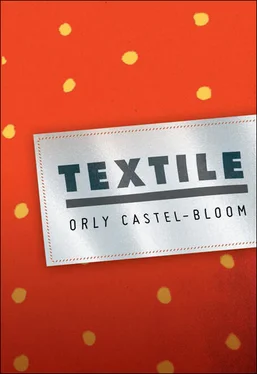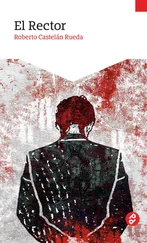Obviously the girls received the best education in the world, thanks to the excellent educational system in the town which their grandparents migrated to for precisely this reason. They were both very spoiled, too much so in Bahat’s opinion, but she didn’t really have a say in the matter because Samantha took over Sara and Ruth as if they were her own daughters, and Bahat knew that even if she wanted to go back to Israel with the girls, they wouldn’t cooperate with her because of their grandmother.
AFTER TEN YEARS of marriage, on her thirty-first birthday, Bahat caught Randall on a table in the family hothouse next to one of big heaters, screwing Emily Boston, his first love from the age of fourteen. The two of them had not anticipated her arrival, since Pa had gone to rest and Bahat was supposed to be in the store helping Ma, or at most, sitting at home and reading an academic article about capillary physiology.
Later, Bahat discovered that Randall had returned to the bosom of Emily Boston soon after Ruth was born, in other words the affair had been going on for nearly seven years.
Randall promised Bahat that he would stop seeing Emily, but he was wasting his breath, because Bahat wanted a divorce, and Randal married Emily Boston.
After the divorce, Randall and Emily Boston moved to Boston, to a two-hundred-year-old house overlooking the river, where the plumbing kept breaking down and the repairs cost a fortune.
Randall’s parents stayed in Ithaca until the day they died, which was not long ago, one after the other, and they saw it fit to leave their house to their granddaughters, but until the girls reached the age of twenty-one, their mother could do whatever she liked with it.
Ostensibly Bahat could have gone back to Israel with her daughters, who had since understood that she was their real mother and they had better listen to her, but Bahat was deep into her research on the Nephila , funded by the Ithaca Municipality, Cornell University, the Pentagon, and the French Ministry of Health. This being the case, the girls went to college, one to study mathematics and the other fractal geometry, and they lived in a rented apartment, while downtown Bahat became acquainted with her loneliness. She operated the stores from a distance, by means of hired workers, and to tell the truth she didn’t really care about the business anymore, as long as they brought in what was expected of them every month.
In those sad days a Reform synagogue called Tikkun v’Or was opened in Ithaca, and Bahat found some consolation in it, especially in the Kabbalat Shabbat at the beginning of the Sabbath and the Havdalah at the end, even though the latter was sometimes held before the Sabbath was actually over. She liked singing the prayers without an American accent and in a loud voice, so that all the Reform Jews would hear and learn.
MCPHEE’S MAIN ACHIEVEMENT with the golden orb weavers to date was the doubling and tripling of the number of spinning glands on the abdomen on the female spinner, and she had even interfered with the control mechanism of the gene, forcing the female Nephila spiders to spin more and more, faster and faster.
She worked day and night to increase the spinning rate, but she devoted her weekends to attending services at Tikkun v’Or, and recently she had even spoken to one of the regular worshippers, an architect by profession who had taken part in designing the synagogue, about saying a prayer to the Divine Presence for the wellbeing of her daughters and the success of a very important experiment, without going into detail about it due to the highly confidential classification of the project.
Now the arachnologist McPhee stood in the arrivals hall of the Syracuse Airport, holding a yellow cardboard sign on which was written with a black marker in Hebrew “Irad Gruber,” with a drawing of a spider underneath it, spinning its web from the last r in “Gruber.”
She was wearing her best clothes and her hair had been dyed to the roots, because she wanted their meeting to be something big.
She was worried about the identification. Not that she was afraid of espionage or some kind of swindle, she just wanted to identify the Israeli as quickly as possible and drive him home with her so he could rest, the guy must be asleep on his feet.
He had sent her his photograph by email, but photographs can be misleading.
BUT WHEN THE TIME CAME, BAHAT HAD NO DOUBT AT ALL. She would have recognized him even if he had arrived on a Jumbo Jet instead of the little blue American Airlines plane. He advanced toward her, full of aches and pains, barely able to carry himself and his briefcase, dragging the medium-sized wheeled suitcase behind him. Bahat threw the placard with his name on it into the litter bin, walked straight up to him, and said in Hebrew:
“Shalom, shalom , welcome. Give me your case, you look exhausted. Soon everything will be all right, don’t worry.”
Gruber looked at her with an astonishment that embarrassed her. What had he expected? she asked herself.
They shook hands and felt a mutual aversion, stemming from the fact that they were strangers after all, but then, as if in response to a signal agreed upon in advance, they both began behaving according to accepted norms of a business meeting. Communication which was ostensibly personal, but on the most general and boring level.
“Boy, am I exhausted,” replied Gruber, and noticed that she had dyed her hair, even her scalp was brown, “I feel as if I’m on my last legs.”
“Everything will be all right,” said Bahat, and took over the job of dragging the wheeled suitcase, too. She tried to match her pace to his, which was slower than hers. “You have nothing to worry about. You can relax after all the tension of the journey.”
“My problem is my back,” Gruber informed her, “I think that my entire spine is dislocated.”
“We’ll see what we can do about it,” said Bahat and smiled at him.
Naturally they got a bit lost, because even though Bahat had written down exactly where she had parked her car, and also the color of the row where it was parked, she had lost the note with all these important details on it. And so the inevitable moments followed, during which she stood still and felt the familiar foolish feeling while she searched miserably for the lost note, even the color of which she had suddenly forgotten. While not yet not admitting to herself that she was becoming sclerotic even before reaching the age of fifty, she let out an impatient breath and shook her head in a gesture of annoyance with herself because on no account did she want to expose her sclerosis to the visiting scientist. Luckily, in the end she found the note, in the back pocket of her jeans, the pocket in which she had kept important things as a child and as a girl in the army. She thanked some historical self and changed her mood completely, from nervous embarrassment to something new and challenging, and by the time they reached her beautiful car she was in high spirits and filled him in on the doubts she was having at that very moment: whether to take him home first and then to the masseur, or first to the masseur and then home. In the end she decided on her own initiative, since at that moment in time Gruber was simply passive. He wasn’t interested, he wasn’t listening to her, and she decided that while he was getting a massage, she would take the briefcase and the suitcase home. It wasn’t far, it was all downtown.
IN THE CLEAN and freshened up car (for she had washed it that same day and thrown out all the rubbish that had accumulated on the back seat), she told him that lately she had been forgetting things and that she was worried.
Her Hebrew sounded strange to him. Something about the accent seemed wrong. Her r was a little too pronounced, perhaps to hide the American r she had picked up. Her voice jarred on him too. He didn’t listen to what she was saying, and instructed himself to remain passive and hope for the best. This was the category of mental activity demanded of him. And the decision enabled him to sink into himself.
Читать дальше












